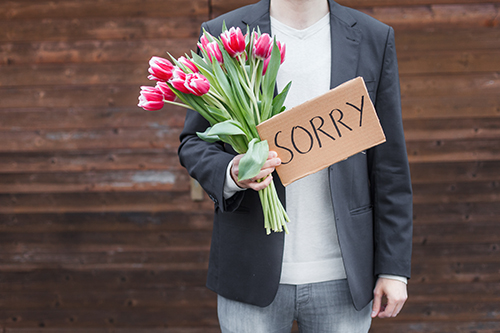
Have you ever found yourself in a situation where you were being blamed for something that you knew you did nothing wrong? This type of situation can be difficult to manage but what about when you know, you did something wrong and the results of what you did have damaged an important relationship. How have you handled it in the past? Realizing you have done something wrong is one thing. Being able to come to the point of knowing if and how to apologize is another matter—in fact, it is a skill. Mastering this skill involves both coming to terms with how you feel about the situation, and choosing your words carefully. Let’s talk more about how to apologize.
Before we do, though, let’s define apology, just so we are all on the same page. An apology is a statement of genuine remorse for something you said or did that negatively affected someone else. Determining when you legitimately owe someone an apology is a skill in and of itself. For example, if you set a healthy boundary with a family member or coworker, and their reaction is to guilt trip you in an effort to change your mind, that’s one time you should not apologize. If you’re being held accountable for a task you could not have completed because someone up the supply chain didn’t do their part, it’s probably more important to troubleshoot than it is to apologize. On the other hand, you might find yourself in a situation where you can clearly see that your actions have upset someone. In that case, it is more important to apologize. It is the right thing to do because the strength and health of your relationships (e.g., spouse, family, good friends) are more important than always being right.
That’s the key to apologies. You can be genuinely sorry you hurt a person even if you don’t completely understand their point of view.
So, why is apologizing so difficult?
Because the need to apologize goes hand in hand with conflict. Whether a co-worker comes to you to say you disrespected them, or whether you are arguing with your spouse, because they are upset with you, it is uncomfortable. We want to be seen as good people. When we’re confronted about something we did or said, our gut reaction is generally defensiveness, and that’s where we run into trouble.
What’s the number one thing you can do to undermine an apology? Use the words “but” or “if.” “If you really knew what was going on you would better understand.” “I’m sorry, but—” are qualifying statements. What follows the “but” is most likely an explanation of why the situation isn’t really your fault. This kind of “apology” is something we say when we’re still upset and want to get our accuser off our backs. We also say it when we feel our intentions were misunderstood. Apologizing is not necessarily about our intentions. It is about the impact of our actions. When we push past our desire to defend ourselves, and focus on how the other person was impacted, we discover something vital:
Apologizing is an act of compassion.
Once you view apologies through that lens, they become easier to say. Remember the golden rule, “treat others as you would want them to treat you.” In this case, focus on how you would like to feel after receiving a genuine apology, and then do what it takes to foster that feeling. It is important to make eye contact, show compassion in your expression, and have appropriate body language (i.e., have your body facing them not turned to the side). Keep your words simple and sincere. True apologies are not always easy to come by but those who are able to identify quickly when and how to apologize, I find have much stronger and healthier relationships.
Be safe and enjoy your 4th of July weekend. Let us never forget the sacrifices made to secure our liberties and independence.
God Bless,
Doug Hedrick

